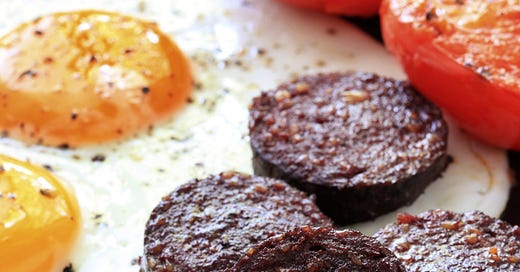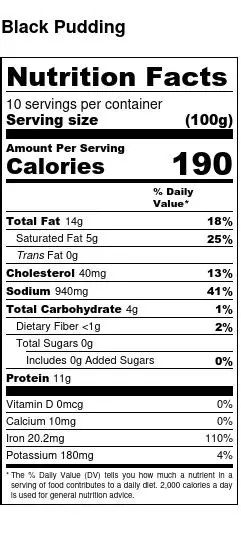On Black Pudding, The Breakfasting Arts IV
The fourth part of a culinary tour of the English breakfast.
One of the essential cornerstones of an English breakfast is black pudding. It might not be the headliner like the bacon or sausage but it’s essential to the whole balance and look of the meal and adds the third meaty element which would otherwise be much missed in England. Our Celtic neighbours have other alternatives which I’ll return to in future, but in England the black pudding’s importance is elevated by the lack of rivals.
I must admit though that the prompting for this post was seeing this rather endearing headline shared online. I’ve already covered marmalade, boiled eggs and bacon in this series.
Black pudding is a blood sausage, originally cooked by boiling (hence the pudding name) and then sliced and fried. It manages to be both rich and savoury, and can be fried to a perfect texture just on the verge of crunchy. It’s made with blood, fat, seasonings and usually with oats worked into the mix as well.
Photo courtesy of www.blackface.co.uk
Despite people’s aversion to the bloody nature of the food, most countries with a tradition of pig keeping have a very similar food. The Polish kaszanka is their tradition, substituting buckwheat groats for the oats and it tends to be used as a barbecue food rather than for breakfast.
Being made of an offal product, the price tends to be reasonable and even in our era of sky high inflation it’s still available for reasonable prices. There are meant to be various special versions, such as that from Stornoway in Scotland or from Lancashire but I’ve never come across a true butcher’s one that was in any way lacking. Even the ones in the work canteen are acceptable, though rather on the mild side. Apparently the Scots deep fry them, but they are known to have rather a penchant for doing this to everything.
It’s also notable for being fairly high in protein, coming in around the same level as eggs.
It’s a non-negotiable part of the fried breakfast, as vital as bacon itself. The different colour, texture and taste combine with its innately thrifty nature to make it the unsung hero of the full English.





